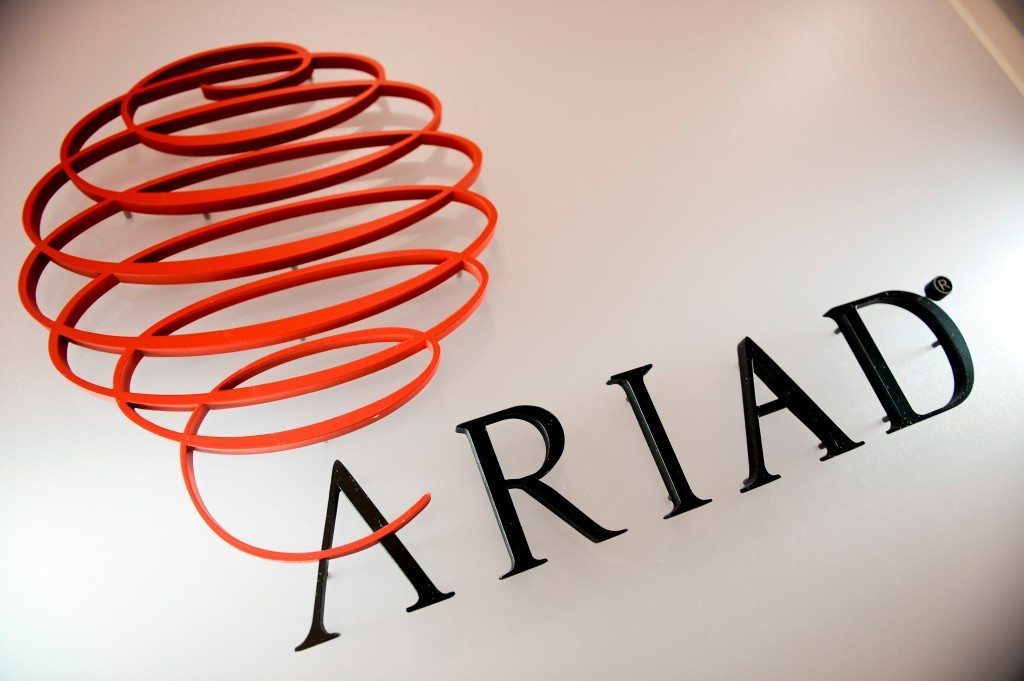Investors that have tracked the biotech space over the past few years, and specifically those familiar with oncology innovation, will remember the furor surrounding Ariad Pharmaceuticals Inc. (NASDAQ:ARIA), and its lead product Iclusig. To recap, the FDA approved the drug in a chronic myeloid leukemia indication back in 2012, three months ahead of schedule. Eighteen months later, however, the agency suspended Iclusig for two months, while it ran an investigation into the drug’s safety profile. Reports of serious adverse events, heart attacks and blood clots to name a couple, proved cause for a reevaluation of its risk/benefit profile, and Ariad (and its shareholders) suffered steep losses on the announcement. Before the beginning of 2014, however, Iclusig once again hit shelves, albeit with a revised and reissued black box warning.
Despite the controversy, however, the drug has slowly taken hold of its target indication, and is gradually becoming a winner for Ariad. At the beginning of December, 2015, the company put a sales estimate of around $120 million for 2015, and expects this to inflate throughout 2016.
One of the drivers behind this inflation, and the reasoning behind us taking a second look at the drug in question, is the submission of an NDA to the Pharmaceuticals and Medical Devices Agency (PMDA) in Japan, for an extended global application of Iclusig in the region. CML is a real problem in Japan, and as the nation’s demographics continue to skew towards the elderly, is likely to become even more so. If the company can achieve a decent level of penetration in the Japanese CML space, it’s Japanese revenues could easily, and quickly, outstrip the sum of its global sales. With this in mind, let’s revisit the drug itself, and try to put some timeframes on the drug’s quantitative impact on Ariad.
The drug is what’s called a tyrosine-kinase inhibitor. We’ve dived into the science behind a number of cell inhibition here at Market Exclusive before, so for those reading this who are already up on the way TKIs work, bear with us. For those that aren’t, let’s cover it quickly. Every nucleated cell has a pathway through which signals pass to tell the cell to do something, be it replicate, grow etc. TKs are a type of enzyme that perform phosphorylation (the adding of a phosphate to a protein), which is a key step in sending signals down the pathway. TK inhibitors stop the phosphorylation process, and in doing so, stop the signal reaching the nucleus. This, in turn, stops the cell proliferating.
At the moment, the drug is only approved in cases where standard of care treatments are ineffective. This limits its population to – on average – low to medium double digit percentages of CML sufferers. Ariad is working on expanding this figure, with ongoing trials targeting an improved efficacy and safety profile, but focusing solely on its current application, what is the potential financial implication of an approval in Japan?
Well, adverse events aside, another controversial factor associated with Iclusig is its pricing. On average, the drug costs $116,000 a year, putting it in the upper echelons of expensive cancer drugs. If Ariad replicates this pricing in Japan, and there is no suggestion that it can’t or won’t, then the company could be looking at a real game changer.
Let’s say that 25% of CML sufferers don’t respond to SOC (not unreasonable, perhaps even conservative). There are currently circa 11,000 individuals in Japan suffering from CML, and the disease affects 1 in 100,000 Japanese individuals. With Ariad targeting 25% of the current patients, the company has a population of 2,750 to go after. At its current pricing, this puts a target revenue figure on the drug in Japan of just shy of $320 million – close to three times its current annual (global) Iclusig sales. Of course, this relies on a successful marketing strategy and, before that, a green light from the Japanese health agency. The adverse events that drove the FDA to halt sales a couple of years ago will no doubt play into the decision, and this adds an element of doubt to the situation.
If approved however, there will likely be some immediate upside in Ariad’s market cap, and if the company can execute strongly, it’s bottom line going forward. We’ve not got a set date – the PMDA don’t issue an equivalent of the PDUFA date we get from the FDA – but Ariad has reported it expects a decision in the second half of 2016. Nearer term, keep an eye on updates from the ongoing expansion trials to gain insight into further applications ahead of decision day.
